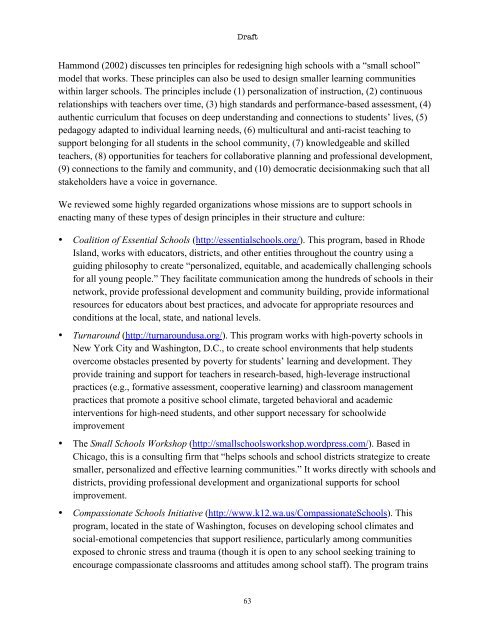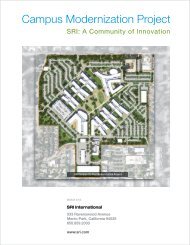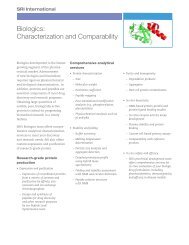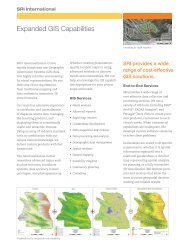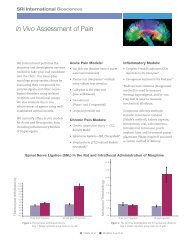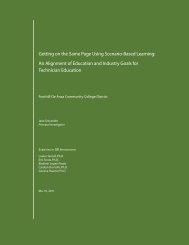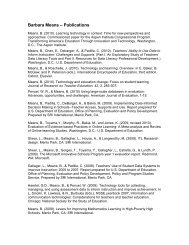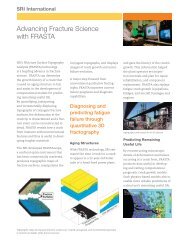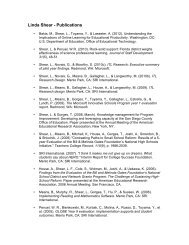Promoting Grit, Tenacity, and Perseverance - U.S. Department of ...
Promoting Grit, Tenacity, and Perseverance - U.S. Department of ...
Promoting Grit, Tenacity, and Perseverance - U.S. Department of ...
Create successful ePaper yourself
Turn your PDF publications into a flip-book with our unique Google optimized e-Paper software.
Draft<br />
Hammond (2002) discusses ten principles for redesigning high schools with a “small school”<br />
model that works. These principles can also be used to design smaller learning communities<br />
within larger schools. The principles include (1) personalization <strong>of</strong> instruction, (2) continuous<br />
relationships with teachers over time, (3) high st<strong>and</strong>ards <strong>and</strong> performance-based assessment, (4)<br />
authentic curriculum that focuses on deep underst<strong>and</strong>ing <strong>and</strong> connections to students’ lives, (5)<br />
pedagogy adapted to individual learning needs, (6) multicultural <strong>and</strong> anti-racist teaching to<br />
support belonging for all students in the school community, (7) knowledgeable <strong>and</strong> skilled<br />
teachers, (8) opportunities for teachers for collaborative planning <strong>and</strong> pr<strong>of</strong>essional development,<br />
(9) connections to the family <strong>and</strong> community, <strong>and</strong> (10) democratic decisionmaking such that all<br />
stakeholders have a voice in governance.<br />
We reviewed some highly regarded organizations whose missions are to support schools in<br />
enacting many <strong>of</strong> these types <strong>of</strong> design principles in their structure <strong>and</strong> culture:<br />
• Coalition <strong>of</strong> Essential Schools (http://essentialschools.org/). This program, based in Rhode<br />
Isl<strong>and</strong>, works with educators, districts, <strong>and</strong> other entities throughout the country using a<br />
guiding philosophy to create “personalized, equitable, <strong>and</strong> academically challenging schools<br />
for all young people.” They facilitate communication among the hundreds <strong>of</strong> schools in their<br />
network, provide pr<strong>of</strong>essional development <strong>and</strong> community building, provide informational<br />
resources for educators about best practices, <strong>and</strong> advocate for appropriate resources <strong>and</strong><br />
conditions at the local, state, <strong>and</strong> national levels.<br />
• Turnaround (http://turnaroundusa.org/). This program works with high-poverty schools in<br />
New York City <strong>and</strong> Washington, D.C., to create school environments that help students<br />
overcome obstacles presented by poverty for students’ learning <strong>and</strong> development. They<br />
provide training <strong>and</strong> support for teachers in research-based, high-leverage instructional<br />
practices (e.g., formative assessment, cooperative learning) <strong>and</strong> classroom management<br />
practices that promote a positive school climate, targeted behavioral <strong>and</strong> academic<br />
interventions for high-need students, <strong>and</strong> other support necessary for schoolwide<br />
improvement<br />
• The Small Schools Workshop (http://smallschoolsworkshop.wordpress.com/). Based in<br />
Chicago, this is a consulting firm that “helps schools <strong>and</strong> school districts strategize to create<br />
smaller, personalized <strong>and</strong> effective learning communities.” It works directly with schools <strong>and</strong><br />
districts, providing pr<strong>of</strong>essional development <strong>and</strong> organizational supports for school<br />
improvement.<br />
• Compassionate Schools Initiative (http://www.k12.wa.us/CompassionateSchools). This<br />
program, located in the state <strong>of</strong> Washington, focuses on developing school climates <strong>and</strong><br />
social-emotional competencies that support resilience, particularly among communities<br />
exposed to chronic stress <strong>and</strong> trauma (though it is open to any school seeking training to<br />
encourage compassionate classrooms <strong>and</strong> attitudes among school staff). The program trains<br />
63


